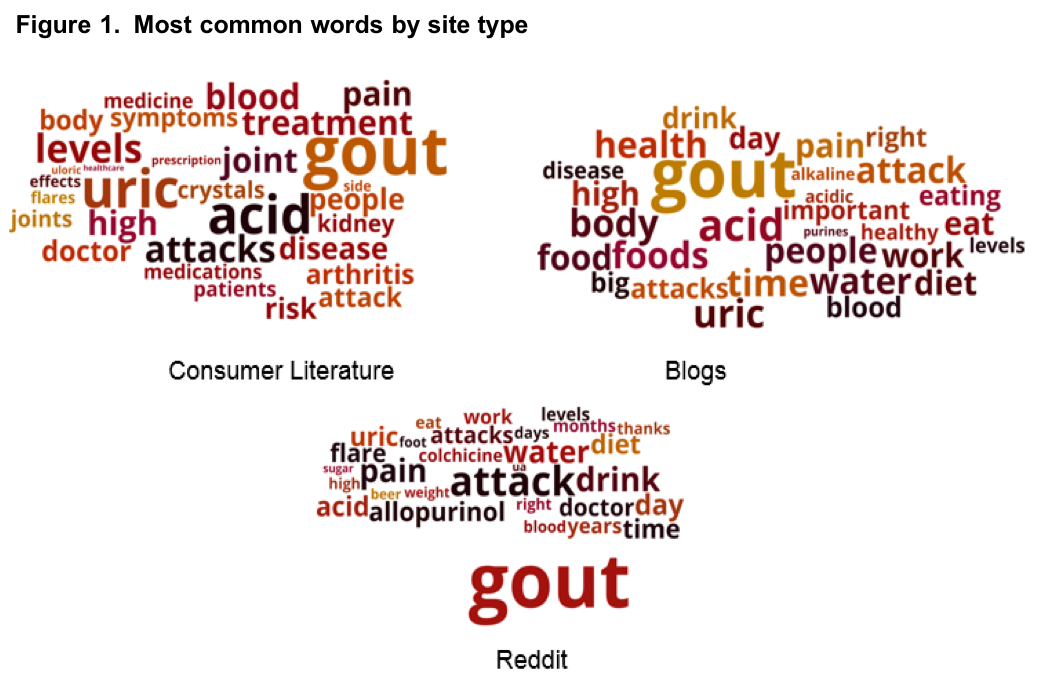Session Information
Session Type: ACR Poster Session C
Session Time: 9:00AM-11:00AM
Background/Purpose: Non-adherence to gout medication is high. This may be due in part to patients’ belief that gout is primarily caused by overindulgence in certain foods and beverages and that it can therefore be alleviated by diet change alone. We sought to identify whether an incongruence existed between professional web-based content created for gout patients and patient’s online discussions.
Methods: Using word frequency analysis and NLP, we examined linguistic differences in a convenience sample of professional webpages and online patient discussions for gout, comparing content from three types of media: 1) consumer literature for patients posted on websites by health organizations (e.g. Gout and Uric Acid Education Society, WebMD, Mayo Clinic) and pharmaceutical companies (n=205 webpages with average of 330 words/page); 2) patient blogs (e.g. gout blogs on patient.com) (n=337 blogs average 641 words/post); and 3) social media (e.g. gout subreddit, a forum on the website Reddit where people can post thoughts or questions for comment) (n=687 original posts average 157 words/post and n=5274 comments average 70 words/comment), excluding posts or comments <20 words. Each unique page on a website relevant to gout was collected and saved into separate text files. After processing and cleaning, consumer sites, blogs, original and reply posts on Reddit were analyzed separately. Differences in psychological processes were identified using LIWC2015 (Pennebaker, Boyd, Jordan, & Blackburn, 2015), a text analysis program measuring a number of psychological dimensions.
Results: LIWC analysis yielded two main findings: 1) consumer sites had greater health focus, shown by use of words like doctor, pain, disease (d=1.34), while blogs/social media, had slightly greater focus on ingestion (i.e. food/drinks) indicated by words such as eat, sweet, feed (d=0.18); and 2) professional and health sites used more risk-oriented language (d=0.57) concerned with prevention and losses (e.g. words like lose, lack, worse), while blogs/social media were somewhat more reward-oriented (d=0.43) focused on potential benefits and gains of treatment and prevention (e.g. words like optimistic, success, and good). All differences between the two groups were significant (p<0.01) and showed comparable patterns across all three types of media. One commonality between sites is frequent discussion of symptoms (e.g. attacks and flares). Word clouds (Figure 1) showed the 30 most common words in each type of site based on basic frequency analysis methods.
Conclusion: People living with gout focus more on food and diet, whereas medical professionals emphasize medical causes and preventions/treatments. More research is needed to determine the most effective ways to encourage patients to seek treatment beyond diet and lifestyle changes.
To cite this abstract in AMA style:
Nowell WB, Jordan K, Gavigan K, Tharp L, Curtis JR, Pennebaker J. Linguistic Differences in Gout-Related Online Content: A Comparison of Professional Health Literature for Consumers Vs Patients’ Online Discussions of Gout [abstract]. Arthritis Rheumatol. 2017; 69 (suppl 10). https://acrabstracts.org/abstract/linguistic-differences-in-gout-related-online-content-a-comparison-of-professional-health-literature-for-consumers-vs-patients-online-discussions-of-gout/. Accessed .« Back to 2017 ACR/ARHP Annual Meeting
ACR Meeting Abstracts - https://acrabstracts.org/abstract/linguistic-differences-in-gout-related-online-content-a-comparison-of-professional-health-literature-for-consumers-vs-patients-online-discussions-of-gout/

